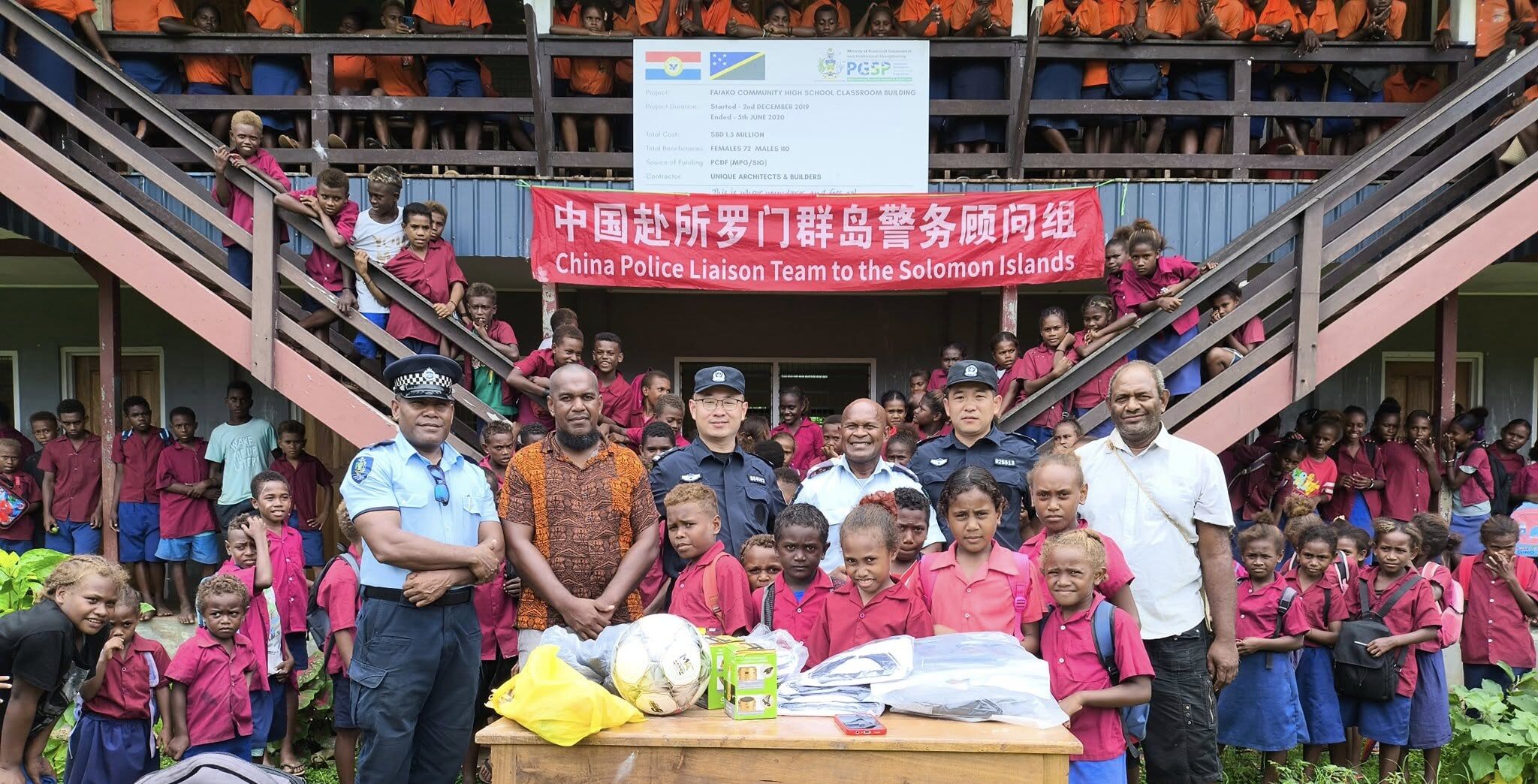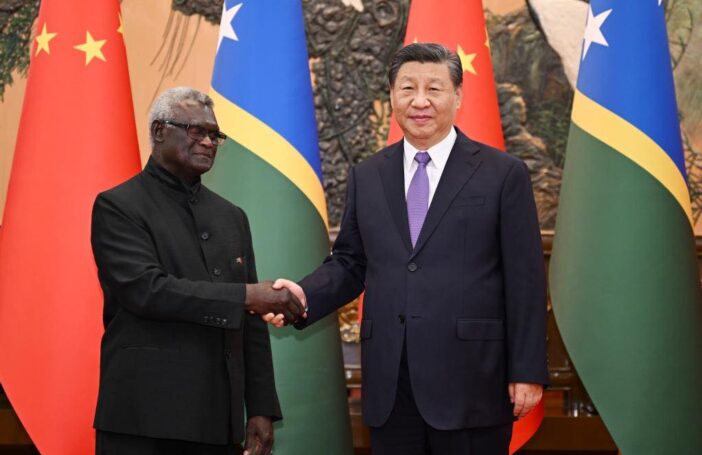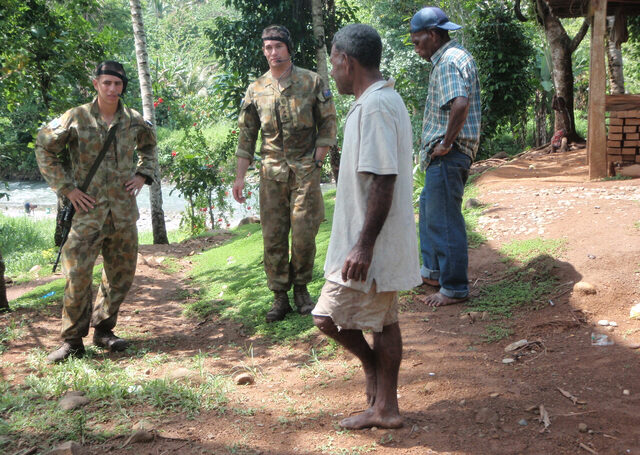This is a further instalment in the Pacific Family Matters series.
The rise of China in the Pacific region has brought countries like Solomon Islands, and the region at large, into the spotlight. Australia’s Albanese government has ramped up spending and engagement to balance influence and the US has made sharp rebukes about Chinese regional engagement. The Solomon Islands case, elaborated below, suggests it might be time for all actors, including the Solomon Islands government, traditional regional powers and China, to think and act differently about how external players engage in the region and align with local priorities.
Solomon Islands, like many other Pacific Island countries, is trying to balance its relations with the US and China as the two superpowers compete for influence — and also with Australia as its primary development partner. In this context, many Solomon Islanders feel frustrated by persistent pressure to choose between development partners given uncertainties about commitments, including contradictions around the implementation of US financial promises and other engagements. As Joanne Wallis, Emily Conroy and Cayleigh Stock say: “Much of the US’s front-stage diplomatic rhetoric is not supported by the reality of substantial backstage funding commitments or policy implementation.”
Such considerations raise the question for some Solomon Islands analysts whether there is a need to reposition the role of China in Solomon Islands’ foreign policy and create stronger platforms to allow collaboration and complementarity among traditional and emerging partners. This is not to suggest Beijing should have a privileged relationship with Honiara. Rather, it’s a matter of stimulating discussion about how Solomon Islands can best promote its national interest in the context of great power competition and remain firmly in the driver’s seat.
From the Solomon Islands’ perspective, its growing relationship with China brings both opportunities and challenges.
Following Honiara’s recognition of Beijing, China’s engagement has been visible in infrastructure provision, financial assistance and many other areas. China funded the US$119 million national sports stadium and affiliated facilities in Honiara. This was one of Beijing’s commitments when the Sogavare government made the decision to sever official relations with Taiwan. In January 2025, China handed over a comprehensive medical centre at Solomon Islands National Referral Hospital and donated advanced medical equipment, which allows some complicated surgeries to be performed locally.
To boost support for China in the Malaita province, a former supporter of relations with Taiwan under premier Daniel Suidani, the Chinese government is delivering a major road-maintenance project in Auki, the provincial capital. Besides infrastructure, China is making solid progress in delivering policing support, Chinese language teaching, government scholarships and training. In 2024, China provided nearly 40 government scholarships to Solomon Islands, twice the number for the other Pacific Island countries on average. Since the diplomatic switch, officials from ministries in Solomon Islands have visited China on study tours nearly every month.
China is also active in subnational areas that see less development attention. Chinese local governments have been actively pursuing collaborations with Solomon Islands’ provinces. For example, the sister relationship formalized in 2024 between Malaita Province and Jiangsu Province has resulted in support from Jiangsu in the form of essential livelihood materials and training initiatives. A delegation from Renbel Province visited China in May and signed a letter of intent with Hainan Province, a crucial step towards establishing a sister relationship. Moreover, Western Province recently hosted a delegation from Fujian Province to deliberate on investment-related matters after establishing such a relationship. Finally, in April 2025, the Premier of Isabel Province, with the Vice Chancellor of Solomon Islands National University, visited China and signed several agreements, including one with the Ocean University of China to establish a mariculture and aquaculture research and development centre.
In light of all these developments, many Solomon Islanders, including senior government officials, call out negative Western narrratives which downplay the involvement of China in the development of Solomon Islands. Professor Transform Aqorau further highlighted that: “The fear that Pacific nations are merely passive pawns in a great power contest does not align with the historical and cultural realities of our region.”
Nevertheless, as in other Pacific Island countries, there are concerns among some groups about debts arising from Chinese loans. China is the second largest creditor in the Pacific region after the Asian Development Bank, but the main creditor of Tonga, Samoa and Vanuatu. Based on recent research by one of us (Zhang), while the majority (more than 80%) of surveyed university students like China-funded infrastructure projects in Solomon Islands, 55% of them do not think the Solomon Islands government should borrow money from China to finance the country’s development. It is encouraging that China has increased its grant aid to the Pacific region from U$281 million in 2008-2012 to U$530 million in 2013-2017, and further to US$679 million in 2018-2022, according to the Lowy Institute’s Pacific Aid Map.
Some of the other challenges identified by scholars before the diplomatic switch, such as the perceived weakness of state institutions and the inequalities in business relations between Chinese firms and indigenous Solomon Islanders, are arguably still valid. For example, the domination of the retail sector by Chinese (and other Asian) businesspeople, coupled with complicated domestic political dynamics, fed into the riots in Honiara in 2006 and 2021. Based on survey research involving Pacific island scholars, university students and NGOs, these riots could recur in the future.
The secrecy of the security agreement signed by the Chinese and Solomon Islands governments in 2022 raised the issue of transparency. There have also been reports about China’s efforts to influence media reporting in Solomon Islands. And recently, after the motion of no confidence, overseas media reports highlighted China’s influence on domestic politics in Solomon Islands — triggering a denial by the Chinese Embassy in Honiara.
In light of these recent developments, perhaps it is a good time for the Solomon Islands government to re-evaluate the role of its major partners, such as the US, Australia, New Zealand and China, within Solomon Islands’ new foreign policy framework, guided by the “friends to all and enemies to none” principle.
Ultimately, as a sovereign state, Solomon Islands needs to decide on the best way to engage with partner countries and promote its national interests — which include accessing greater support for analytical and project management capacity and ensuring alignment between external assistance and national development and security priorities, such as climate change adaptation, which are articulated in national development plans and National Security Strategy. In this process, the Solomon Islands government should clarify and deconflict the role of each of its major donors in terms of priority sectors. This will likely ease tensions between China and traditional powers in the country. It might also reduce pressure on Honiara to “take sides” and improve its currently strained capacity to manage aid from a growing number of donors.
For development partners, including Australia, a better understanding of Solomon Islands’ development aspirations, and of local perceptions of external players, will be crucial to ensure the effectiveness of their engagement with the country, especially in the context of geostrategic competition. For example, more assistance in infrastructure development and capacity building from Australia to the Solomon Islands would boost Australia’s influence. (In May, Prime Minister Jeremiah Manele lauded the announcement of 50 new Australian-funded community infrastructure projects.)
Similarly, more evidence-based academic research at Australian and Solomon Islands universities in the areas mentioned above, and more research collaboration between Australian and Solomon Islands, could better inform policy-making in both Canberra and Honiara.
This is part of the Pacific Family Matters series which explores priorities for the re-elected Labor government’s engagement on development issues with the Pacific Islands region. The series draws on the expertise of the Pacific Research Program, a consortium led by the Department of Pacific Affairs at the Australian National University (ANU), in partnership with ANU’s Development Policy Centre and the Lowy Institute.




